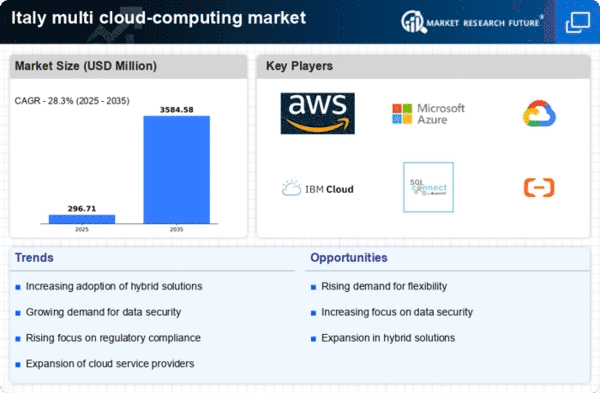Cost Optimization Strategies
Cost efficiency remains a pivotal driver in the multi cloud-computing market. Italian organizations are increasingly adopting multi cloud strategies to optimize their IT expenditures. By distributing workloads across various cloud providers, businesses can take advantage of competitive pricing and avoid vendor lock-in. Recent studies indicate that companies utilizing multi cloud solutions can reduce their cloud spending by up to 30%. This financial incentive is particularly appealing in Italy, where economic conditions necessitate prudent financial management. As organizations seek to maximize their return on investment, the multi cloud-computing market is expected to grow as more businesses recognize the potential for cost savings through diversified cloud strategies.
Rising Demand for Scalability
The multi cloud-computing market in Italy experiences a notable surge in demand for scalable solutions. As businesses expand, they require flexible cloud infrastructures that can adapt to their evolving needs. This trend is particularly pronounced among small and medium-sized enterprises (SMEs) that seek to optimize costs while maintaining operational efficiency. According to recent data, approximately 60% of Italian SMEs are adopting multi cloud strategies to enhance their scalability. This shift allows organizations to leverage multiple cloud services, ensuring they can scale resources up or down based on real-time requirements. Consequently, the multi cloud-computing market is likely to witness sustained growth as companies prioritize scalability to remain competitive in an increasingly digital landscape.
Enhanced Disaster Recovery Solutions
The need for robust disaster recovery solutions is a critical driver in the multi cloud-computing market. Italian enterprises are increasingly aware of the risks associated with data loss and system failures. Multi cloud environments provide enhanced redundancy and backup options, allowing organizations to safeguard their data across multiple platforms. This capability is particularly vital for sectors such as finance and healthcare, where data integrity is paramount. Recent surveys suggest that over 70% of Italian businesses consider disaster recovery capabilities when selecting cloud services. As a result, the multi cloud-computing market is likely to expand as companies prioritize resilience and continuity in their operations.
Growing Adoption of Hybrid Cloud Models
The multi cloud-computing market is significantly influenced by the growing adoption of hybrid cloud models in Italy. Organizations are increasingly recognizing the benefits of combining public and private cloud infrastructures to meet their specific needs. This approach allows for greater flexibility, security, and control over sensitive data. Recent data indicates that approximately 55% of Italian enterprises are implementing hybrid cloud strategies to balance their workloads effectively. The ability to customize cloud environments according to business requirements is driving this trend. Consequently, the multi cloud-computing market is poised for growth as more companies embrace hybrid solutions to enhance their operational capabilities.
Increased Focus on Compliance and Governance
Compliance and governance are becoming paramount in the multi cloud-computing market. Italian businesses are under increasing pressure to adhere to stringent regulations regarding data protection and privacy. The implementation of the General Data Protection Regulation (GDPR) has heightened awareness of compliance issues, prompting organizations to adopt multi cloud strategies that facilitate better governance. Recent findings suggest that nearly 65% of Italian firms prioritize compliance when selecting cloud service providers. This focus on regulatory adherence is likely to drive the growth of the multi cloud-computing market as companies seek solutions that not only meet their operational needs but also align with legal requirements.
















